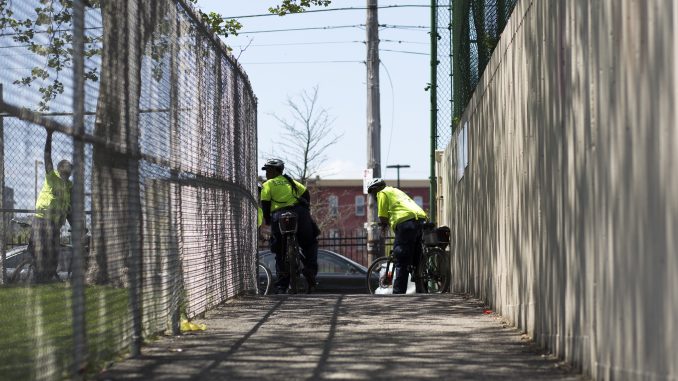
An article published by Temple’s chapter of the student website The Tab alleged security officers in nine university buildings failed to stop a student showing a gift card instead of an OWLcard. Since then, two officers were fired, including one whose photograph was taken and featured in the story.
Students said they have seen more scrutiny when entering buildings around Main Campus.
“They are a bit tight on presenting our IDs in the Engineering Building,” said Shanay Sparrow, a sophomore business major. “[The security guard] asked me, because I hold my ID in the back of my phone, she wanted me to take it out of my case and present it to her, rather than showing it to her in the back of my phone.”
Sara Newman, a freshman dance major, said a security officer in her dorm was more vigilant than usual.
“I live in White Hall, and I think it was a new security guard swiping IDs, and she actually looked at my ID and my picture to see if it was me and my friend when we walked in,” Newman said. “I only go to two buildings for my classes, and the Engineering Building always checks IDs and makes you sign in when you don’t have it. In Pearson, there are always the same guards, and you just walk by and hold it up.”
After The Tab’s post was published on Oct. 20, Gene Cummings, the district manager for Allied Universal at Temple, worked with Temple Police and Campus Safety Services to go through surveillance and review the performance of security officers.
The Tab wrote that there were nine buildings with security issues. Charlie Leone, the executive director of Campus Safety Services, said only two of those locations had officers who were disciplined.
He said two security officers were fired and another received a written warning.
Leone said the layouts of the entrances were too wide, so officers couldn’t properly examine IDs, because students were walking by from far away.
He added that Campus Safety Services is refining the technology at entrances where students have to swipe their IDs.
“The officer was actually doing what they were supposed to do, but because we had the area so wide, it is making it difficult for them to do their job,” he said.
Leone said Campus Safety Services is working to help officers whose setup put them at a disadvantage, like having an entryway that was too wide, and bring people closer to the desk officers were stationed at, so they can more closely examine the IDs. He added that even the desks the officers used might be changed to make their jobs easier.
The recently added security posts in the Student Center, however, are not related to the review of building security. Leone and Cummings both said they had been working with Student Center Operations to set up spots for security officers at both entrances of the Student Center since this summer.
Leone said it was to address concerns of people coming into the Student Center during the evening who should not be. He said while the officers don’t check IDs because the Student Center is still a public building, the security officer would act as a deterrent for some people.
Students may also notice a change in the security officers’ uniforms over the next six days, Cummings said. The change, which started on Friday, was the result of a merger between AlliedBarton Security Services and Universal Services of America in August.
“Most of these changes related to the merger are financial changes, liability, risk management, those types of things are more on the corporate level,” Cummings said. “But down here at the operational level, there are not going to be any changes.”
He added that the security officers would be getting a 50-cent per hour raise starting Jan. 1. The raise is part of a collective bargaining agreement with the security officers’ union and what was AlliedBarton, Cummings said.
Currently, officers start at $10.25 per hour but those who have been there longer are in the “high 11s,” Cummings said, and the raise would push their hourly wage to more than $12. Bike patrol officers for Allied Universal are currently paid $14.70 per hour because their jobs require more training and come with higher risk, Leone said. With the raise, bike patrol officers will be paid $15.20.
Julie Christie can be reached at julie.christie@temple.edu or on Twitter @ChristieJules.
Kelly Brennan and Francesca Furey contributed reporting.



Be the first to comment